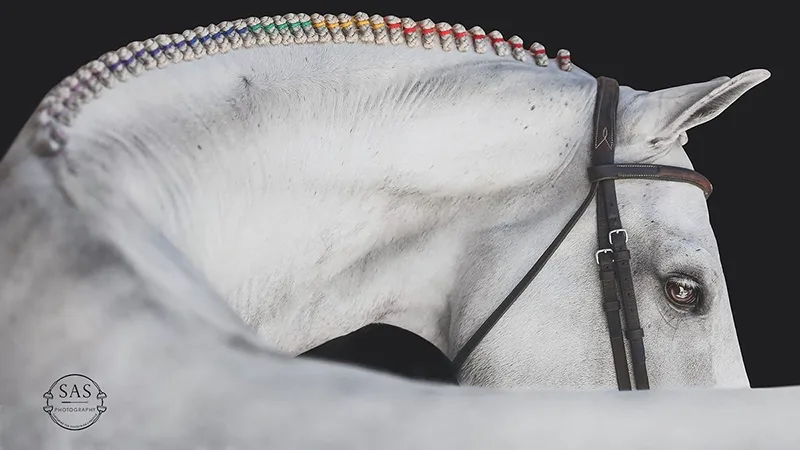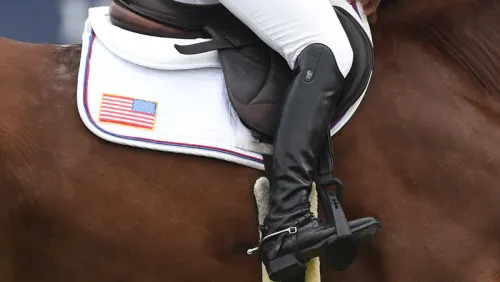Making horse sport, or any sport, safer for LGBTQIA people requires global thinking, such as using inclusive language and statements, holding regular Pride events, and cracking down on slurs and discrimination. Such work is particularly important to make sure children and young people feel welcome within the horse world so they can reap the benefits of participating in sports.
These were among the conclusions reached during a June 30 panel discussion hosted by the U.S. Equestrian Federation that featured three experts on LGBTQIA (lesbian, gay, bisexual, transgender, queer, intersex and asexual/aromantic) issues in sports.

USEF’s June 30 DEI Community Conversation, “An Introduction to LGBTQ+ and Becoming a Better Ally,” will be available for viewing in the Learning Center section at www.usef.org. SAS Equine Photography Photo
The panelists were Ashland Johnson (she/her), founder of The Inclusion Playbook, a sports justice project focused on diversity, equity and inclusion within sports communities; Rebby Kern (they/them) of Equality North Carolina, who works to create more inclusive climates for LGBTQIA youth; and Chris Mosier (he/him), the first out trans athlete to compete for Team USA as a triathlete and race walker.
The panel discussion, “An Introduction to LGBTQ+ and Becoming a Better Ally,” was held via Zoom as part of USEF’s quarterly DEI Community Conversation series on diversity, equity and inclusion.
Inclusivity was a clear theme from the beginning, when host Steven Morrissey included his pronouns (he/him) and a description of his appearance in compliance with accessibility standards. The other panelists followed suit.
The discussion focused on how to make sports, including horse sports, safer and more inclusive for LGBTQIA people, especially youth.
Johnson, who co-authored a Human Rights Campaign study on the state of LGBTQIA youth inclusion in sports, pointed out that while 68% of high school seniors play at least one sport, only 21% of LGBTQIA seniors do, with 13% reporting that they avoid sports because they don’t feel they will be accepted on a team. Sports, she noted, are linked to confidence, better grades and improved mental and physical health outcomes.
“Because LGBTQIA youth are being left on the sidelines, they’re missing out on these benefits,” Johnson said.
Mosier emphasized the important role sports have played in his life, particularly in his connection to himself and to community.
“Sports have been helpful for me in owning the power of my identity,” he said.
After his collegiate athletic career, he started running non-competitively because that didn’t require him to choose a gendered category for competition. Running, however, led him to triathlon and a re-entry into gender-divided sport, where he won his first race. That experience was part of what made him sure he was transgender; he didn’t want to tell people he won the women’s category.
A question-and-answer portion of the session focused largely on allyship, or what those who are not LGBTQIA can do to support the queer community, starting with “What does allyship mean to you?” Kern took this question head on, asserting that the “A” in LGBTQIA does not stand for “ally.”
ADVERTISEMENT
“Allyship means you work in a space, through your proximity to power, to hold the door open for folks to come through,” they said. “Allyship is crucial, but it is not a sexual orientation, gender identity or gender expression. It is a way to do work that is impactful.”
Kern also emphasized allyship as a process of not just learning but also unlearning.
“I want to challenge people to move from allyship as yard signs and giving money to moving in a way that might be uncomfortable because there might be things to learn or unlearn when it comes to gender and how you perceive it in the world,” they said. “That seed of discomfort will let you know where you play a role in terms of power, privilege and access, and lets you ask how you can make room for someone.”
Allies need to be ready to intervene and speak up when biased remarks or situations come up, whether at a horse show or the dinner table, Kern said.
“Be somebody who says not in this house, this is not OK with me,” they said. “That makes a difference.”
Kern also wants people to “push through the fragility and fear of getting it wrong” to be able to better understand what else they may have to learn.
“I was today years old when I discovered there are hundreds of diverse gender identities around the world, that there are countries that honor gender identity in ways our colonized western world doesn’t see,” they said. “It’s about unlearning gender constructs, like pink and blue.”
The panelists encouraged people to think of Pride as more than parties in June.
“Pride started as a riot, a protest led by trans women of color who had been victimized by community and police,” Johnson said. “We have to be better allies to trans women of color and recognize them in the Pride conversation. They sparked the LGBTQIA rights movement in the U.S., and we need to do more to uplift them.”
Mosier made the point that Pride isn’t something to only consider in June.
“I’m queer all year,” he said with a laugh. “And my [public speaking] schedule is shockingly empty from July 1 through May 31. Pride needs to be integrated into your programming all year round, any time you’re lifting up coaches, athletes or community.”
Uplifting the queer community was also key to the panelists’ advice on teaching children to be allies. Kern emphasized the importance of giving children access to stories and resources created by LGBTQIA people so that they can learn from them and see positive representations.
ADVERTISEMENT
Mosier wants people to be more conscientious of language and to aim for more inclusivity, especially given that they can’t know for sure whether they have any LGBTQIA people around them who are not out.
“Part of why I didn’t play college basketball, which was my dream as a young child, was because I couldn’t picture myself being on a team where a coach said, ‘All right ladies, let’s go girls!’ ” he said. “That gendered language was so uncomfortable to me.”
Johnson made the point that 82% of trans youth aren’t out to their coaches, so assuming all children are cisgender—identifying as the sex assigned at their birth—means some kids will be in continual states of discomfort if coaches don’t work to ensure inclusive language.
“It’s so important to hear these stories from the people who are living them,” Mosier said. “Most of the articles that have come out about trans people in this legislative session have spoken about trans people as a theory, not as if we are real people, but as if we’re a foreign idea. Lots of people believe they’ve never met a trans person. If you’ve never met us, it’s easy to villainize us, to base your assessments on misconceptions and ideas that aren’t positive.”
The variety of transgender voices on social media demonstrates that there isn’t just one way to be a trans or non-binary person.
As the Olympics near, news stories about transgender athletes and legislation surrounding their inclusion in sports again are making headlines. Those athletes are people, too, and legislation about their inclusion in athletics needs to be seen as legislation about their broader human rights, Johnson said. With 33 states currently dealing with legislation that would ban trans people from sports, everyone has a chance to speak up publicly in support of trans people, she said.
This legislation affects equestrians, both as humans in the world and as competitors, particularly at the collegiate level. National Collegiate Athletic Association-recognized competition is open only to women, so trans women are at risk of exclusion, and non-binary people are not allowed to compete.
Membership associations and horse shows are responsible for proactively ensuring inclusivity and safety, rather than waiting for queer and trans members to raise such issues before addressing them.
“Think through how the sign-up process will work for trans and non-binary people,” Mosier recommended. “Make sure that your own systems internally for your competition allow access for non-binary and trans people to openly participate.”
For example, the USEF, U.S. Eventing Association, U.S. Dressage Federation, and most other membership organizations do not currently have a non-binary option for gender in their membership forms.
The panelists agreed the key to genuine inclusivity of LGBTQIA people is amplifying the voices of people in that community and, for allies, looking for ways to make a difference.
“I think [the equestrian world] is coming into the forefront to say we’re putting this work into practice behind the scenes, having the conversations,” Kern said. “If you’re a cisgender heterosexual person, there are ways for you to navigate in solidarity that make a difference.”
A recording of this panel will be available at usef.org with a membership. Free fan memberships are available with the code Inclusion21.














